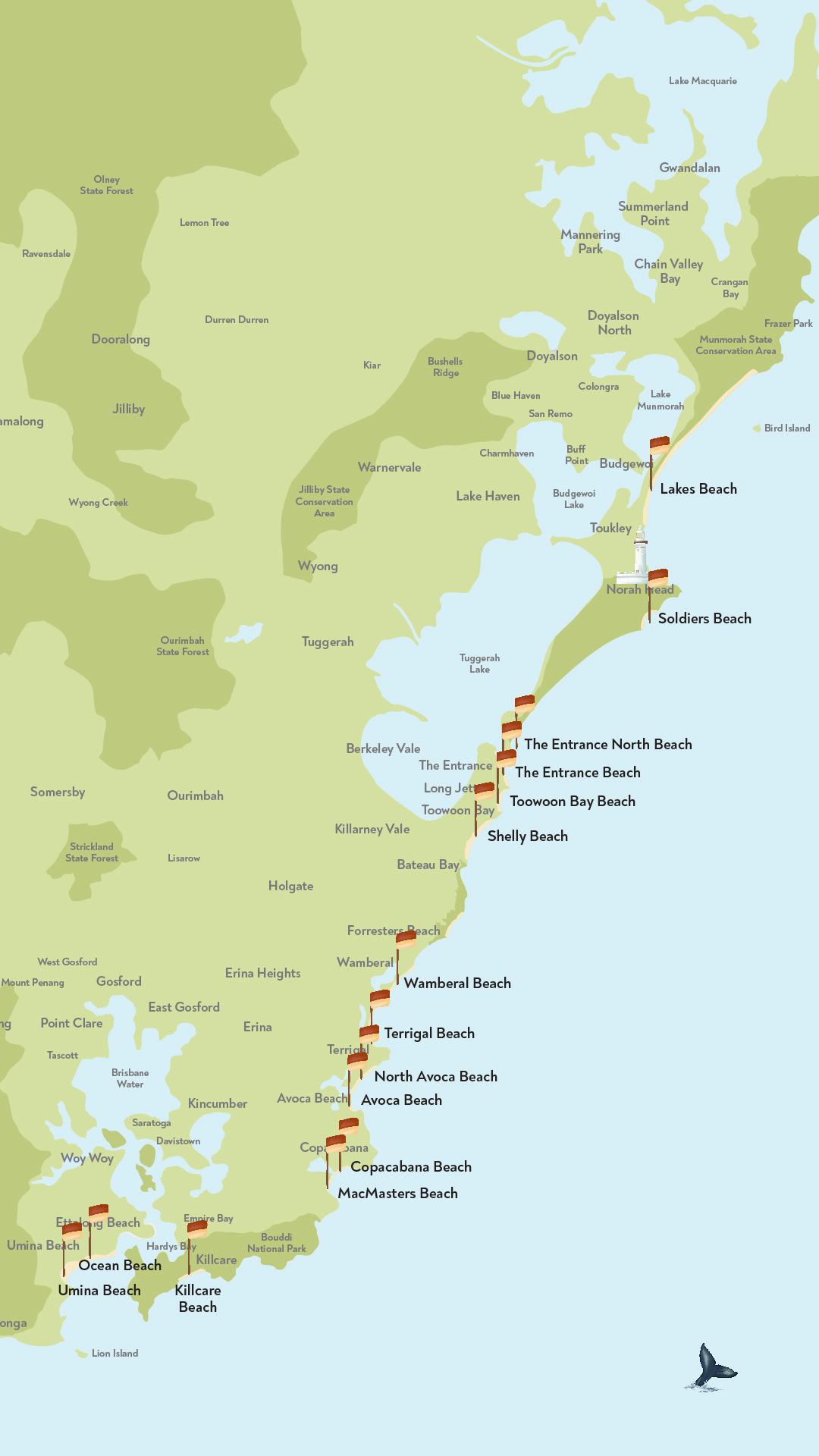Beach safety is everyone's responsibility, and we can all take simple steps to ensure the safety of ourselves and others. Drive the extra five to a patrolled beach, swim between the flags, supervise your children.
The beach patrol season for 2024-2025 is now underway, running from 28 September 2024 to 27 April 2025. Fifteen Central Coast beaches and The Grant McBride Baths are patrolled daily by lifeguards, with Council lifeguards on duty from 9am-5pm Monday to Friday and Surf Life Saving volunteers patrolling on weekends and public holidays. For weekend and public holiday patrol hours, search your local beach on the Surf Life Saving Beachsafe website.
During the busy Christmas holiday period (21 December to 31 January), all 15 beaches and The Grant McBride Baths will have extended patrol hours. Visit the Surf Life Saving Beachsafe website for more information.
From north to south, the patrolled beaches on the Central Coast are: 1. The Lakes Beach, Budgewoi Council lifeguards will also monitor The Grant McBride Baths seven days a week and The Entrance Channel during school holidays. |  |
Beach safety is everyone's responsibility, and we can all take simple steps to ensure the safety of ourselves and others:
- Always swim or surf at patrolled beaches.
- No flags means no swimming.
- Swim between the red and yellow flags.
- Surf outside the black and white flags.
- If lifeguards can’t see you, they can’t save you.
- If you get into difficulty, stay calm, float, raise your arm and yell for assistance.
- If you are unsure of conditions, ask the lifeguard in attendance.
- Read and obey the signs and directions from the lifeguard.
- Never run and dive into water, as the depth can change regularly.
- Learn to identify and avoid rip currents. Rip currents are narrow, dark gaps of water that head offshore between breaking waves and white-water zones. If you find yourself in a rip, raise your hand and float on your back to survive.
- Children should be supervised by an adult at all times
- Always ‘Slip, Slop, Slap, Seek and Slide’ to be sun safe
For safety tips about waterway safety, including fishing, rock fishing, boating and jet skiing, view our waterway safety page.
For more information on beach patrol times, water quality, hiring beach wheelchairs for people with a disability and booking an event on one of our local beaches, view our beaches page.
During the busy Christmas holiday period (21 December to 31 January), all 15 beaches and The Grant McBride Baths will have extended patrol hours. Visit the Surf Life Saving Beachsafe website for more information.
Central Coast Council and the NSW Government encourage the community to be SharkSmart. Download the free SharkSmart app to receive real-time alerts for SMART drumline target shark capture/releases, tagged shark detections, SLS NSW and Surfing NSW drone shark sightings and other shark-related information.
-
Lifeguards and lifesavers work together to help ensure beach safety. Lifeguards are paid professionals employed by Central Coast Council, while lifesavers are volunteers from local Surf Life Saving Clubs.
You can easily distinguish them by their uniforms:
- lifeguards wear blue (as of the 2024-25 beach patrol season)
- lifesavers wear red and yellow.
Both groups patrol the same Central Coast beaches within the red and yellow flags. To provide a seamless seven-day-a-week service, both they work together and share resources.
Council lifeguards typically patrol beaches Monday to Friday, while lifesavers patrol on weekends and public holidays. Additionally, Council provides patrols at locations on the weekend and public holidays, such as at Budgewoi Beach during the summer holidays and Grant McBride Baths all year round.
-
The red and yellow flags identify the area that is under supervision and monitored by lifeguards or lifesavers. No flags means no swimming.
-
If you get into difficulty, stay calm, raise your arm and yell for assistance.
-
Slip on a long-sleeve shirt, slop on sunscreen (SPF 30+ minimum), slap on a hat, seek shade and slide on sunglasses. To learn more about how to be sun smart, visit Cancer Council website for more sun safety tips.
-
No. Children should be supervised by an adult at all times. To learn more about how to stay safe at the beach visit Surf Life Saving New South Wales
-
With the push of a button, members of the public can be connected to the SLSNSW State Operations Centre where a State Duty Officer will be on hand to gather important information, issue instructions or provide reassurance in an emergency situation.
The Central Coast has three Emergency Response Beacons located at the following site:
- Budgewoi Beach
- The Entrance Channel
- Pearl Beach
For more information on Emergency Response Beacons visit - Emergency Response Beacons - Surf Life Saving NSW
-
For year-round safe swimming, visit The Grant McBride Baths, Toukley Aquatic Centre, Gosford Olympic Pool or Peninsula Leisure Centre.